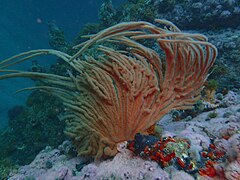The dive site Phone Reef is an offshore, rocky reef in the Castle Rocks Restricted Zone on the Cape Peninsula, near Simon's Town in the Western Cape Province of South Africa.
Understand
edit
This site is moderately deep, but shallow enough for a fairly long dive on nitrox. It is deep enough to avoid much of the surge if there is a moderate swell running, and makes a convenient alternative for days when the surge is a bit strong at the shallower sites. It is quite a nice site and worth a visit at some time.
Position
edit- 1 Phone Reef: S34°14.225’ E018°29.202’ — (Eastern pinnacle)
This site is in a Marine Protected Area (2004). A permit is required.
Name
editThe name "Phone Reef" describes the appearance of the side-scan sonar image of the reef, which looks a bit like the profile of a landline telephone handset.
Depth
editMaximum depth is about 24 m. and the top of the pinnacle is about 14 m. (Average depth of a dive is likely to be about 18 m.)
Topography
editThere is a wall sided pinnacle at the far east end of the reef which drops from a narrow top at about 14 m to the sand at about 24 m, and a cluster of fairly high boulders and outcrops adjacent to it to the west and north. Most of the rest of the reef is relatively low profile bedrock and boulders extending over 100 m to the east. The full extent of the reef to the east and south have not yet been surveyed, and there may be more high profile areas not yet reported.
Geology: Granite corestone boulders and outcrops of the pre-Cambrian Peninsula pluton.
Conditions
editThe site is exposed to wind and waves from the south-east, so should be dived in flat seas or westerly swells. It is reasonably protected from westerly and south-westerly swells.
The site will usually be at it's best in winter but there will be opportunities in other seasons.
Get in
editThis is exclusively a boat dive: It is too far (roughly 1 km) offshore for most people to swim and is in a high boat-traffic zone as it is on the way from the nearby slipway at Miller's Point to most of the local fishing areas.
The site is approximately 1.8 km from Miller's Point slipway and 9.1km from Simon's Town jetty.
See
editMarine life
editThe upper part of the pinnacle is covered by a dense colony of strawberry anemones Corynactis annulata, and the deeper reef has large numbers of the local gorgonian sea fans.
- Strawberry anemones cover the top of the pinnacle
- Roman seabream are territorial, this one owns the pinnacle top
- West Coast Rock Lobster
- Multicolour sea fan
- Flagellar sea fan
- Orange wall sponge
Features
editThe main topographical feature is the steep and pointed pinnacle
Photography
editAs is the case with most of the local reefs, macro photography is likely to deliver the most consistent results. Artificial light will be necessary for macro, and useful for any reasonably close subjects.
Suggested routes
editThere are no special routes recommended. Start deep near the pinnacle and work your way up as available no-stop time decreases. It is possible to do a no-stop dive for an hour on a single cylinder on nitrox.
Stay safe
editHazards
editNo site-specific hazards other than moderate to fairly heavy boat traffic in the vicinity.
Skills
editThe site is too deep for entry level divers. There is very little reef above 18m. The ability to deploy a DSMB is strongly recommended in case you need to surface away from the shotline.
Equipment
editA DSMB and reel or spool is recommended to warn boats of your presence while ascending, and to help your skipper find you after the dive. Nitrox can extend your dive time significantly in this depth range.
Nearby
edit- 1 Miller's Point tidal pool
- 2 Murphy's
- 3 Boat Rock
- 4 Festival Pinnacle
- 5 Fan Reef
- 6 Shark Alley
- 7 Pyramid Rock
- 8 Super Fan Reef
- 9 Outer Castle
- 10 Giant's Castle
- 11 Zigzag Reef
- 12 North Pie Rock Reef
- 13 West Pie Rock Reef
- 14 Castle Rocks Point Reefs
- 15 East Pie Rock Reef
- 16 South Pie Rock Pinnacles
Back to the Alphabetical list of sites, or list of dive sites in the Castle Rocks area
Other regional dive sites:
- Dive sites of Table Bay and approaches,
- Dive sites of the Cape Peninsula west coast
- Dive sites of False Bay offshore and approaches
- Dive sites of False Bay east coast
- Fresh water dive sites of the Cape Town Metropolitan Area







